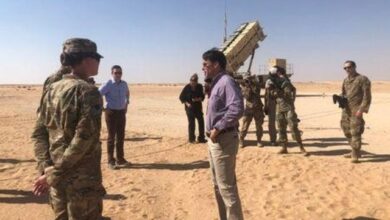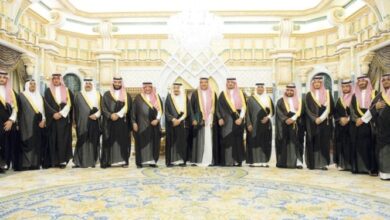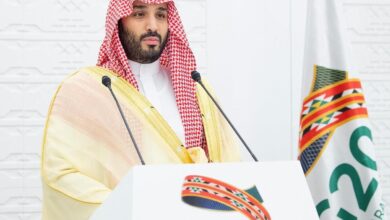This former intelligence official was a hero. He’s now the target of a brutal campaign by MBS.

For intelligence officers, there’s a special horror at abandoning colleagues who helped fight common enemies. There’s a sense of moral betrayal and shattered trust — a violation of the unwritten rules of the spy trade.
Some former senior U.S. and British spymasters are feeling that shock to the conscience now, as they watch the plight of Saad Aljabri, a former top Saudi intelligence officer who helped build the kingdom’s counterterrorism capability — and in the process provided what intelligence officials describe as invaluable help to the West.
Aljabri’s son Khalid, a cardiologist who lives with his father in Toronto, said during interviews that two of his younger siblings — Omar, 21, and Sarah, 20 — were seized and imprisoned in mid-March by the regime of Crown Prince Mohammed bin Salman, who is often referred to as MBS, as leverage to force their father to return to the kingdom from exile in Canada.
MBS’s squeeze on a former pillar of the kingdom’s counterterrorism program stuns those who have dealt with Aljabri. The crown prince’s allies have circulated accusations: that Aljabri knows about theft of operational funds by him and his patron, deposed crown prince Mohammed bin Nayef, and that he’s a sympathizer of the Muslim Brotherhood.
Khalid Aljabri rejected the allegations: “These are baseless claims, and we have proof that they are politically motivated. Whatever allegations they make, nothing justifies holding his children as hostages.” Saad Aljabri declined to comment.
A senior Saudi official reached Thursday night in the kingdom declined to comment on the Aljabri case.
Aljabri’s friends believe that the Western governments Aljabri has helped over the years must come to his aid now. “From a moral and ethical perspective, we have a duty to help him in a time of trouble,” says a former British official, speaking for many of his colleagues.
Omar Aljabri, left, in 2016 at Bentley University in Massachusetts; at right, Sarah Aljabri in Riyadh just days before her disappearance in March.
“What is happening to him and his family is wrong,” Michael Morell, a former acting director of the CIA under President Barack Obama, said of Aljabri in a text message this week. “His work saved Saudi and American lives, in the kingdom and outside. I would trust him with my life, with my own family. I can’t fathom that he would ever plot against his own government.”
George Tenet, who served as CIA director during the Bill Clinton and George W. Bush administrations, expressed similar confidence in Aljabri. “He was just a very solid person,” Tenet said during an interview. He worked with Aljabri, starting in 2003, to build a modern Saudi security system that could combat al-Qaeda and penetrate the ranks of the terror group’s affiliate in Yemen. Aljabri helped oversee a network of informants that exposed a 2010 plot by al-Qaeda in the Arabian Peninsula (AQAP) to send undetectable bombs in computer printer cartridges on American airplanes.
Aljabri, in supervising this operation and many others, helped save hundreds — perhaps thousands — of lives, say former U.S. and British counterterrorism officials. In the fight against al-Qaeda, Aljabri was one of the Arab heroes. Now, he and his family inexplicably are targets of a brutal campaign, and Western governments are not doing enough to help.
Aljabri’s father died when he was a boy in Hail, a desert town northwest of Riyadh. To help support his family, he attended a Saudi police academy and then went to work as a police officer in Taif, in the southwest corner of the country. He studied English and other subjects in his spare time and, in the late 1980s, earned a master’s degree in computer science at a Saudi college in Dhahran. He then helped found the computer science program at King Fahd Security College in Riyadh, where the kingdom’s interior ministry trained its future officers.
Still fascinated by computing and early versions of artificial intelligence, Aljabri became a doctoral student at the University of Edinburgh in 1993 and earned his PhD in 1997 with a thesis on natural language processing in Arabic. He wanted to work for Aramco, the giant oil company, when he returned, but Prince Nayef, the interior minister, wanted this talented young man to join his ministry and teach at the security school.
From then on, Aljabri’s fate was linked with Nayef and Nayef’s son, Mohammed, who was an assistant minister, then head of counterterrorism, then minister himself, and finally the crown prince. Mohammed bin Nayef, or MBN as he’s often called, was also, until he was deposed, the chief rival of Mohammed bin Salman. MBN was arrested on March 6, 10 days before Aljabri’s children vanished.
Saudi intelligence and security services were backward and poorly managed when Aljabri began his partnership with MBN. Prince Nayef, the interior minister, was a conservative who managed an uneasy alliance with the religious leadership. The Saudi response to trouble, at home and abroad, had been to buy the miscreants off. The U.S.-backed campaign to support the mujahideen in Afghanistan during the 1980s had created a network of young extremists who intimidated the royal family.
A sea change began after May 2003, when al-Qaeda operatives attacked a Western compound in Riyadh, killing 35 people, including 10 Americans. Tenet, the CIA director, flew to Riyadh and warned then-Crown Prince Abdullah that the royal family and the country itself were in danger. The Saudis finally got serious. MBN began creating a modern security service, known in Arabic as the “Mabahith.” Aljabri, as MBN’s chief of staff, was the key link to the West.
Saad Aljabri, right, with other members of the Saudi Arabia delegation during a meeting between President Barack Obama and Crown Prince Mohammed bin Nayef in the Oval Office in May 2015.
Saad Aljabri, right, with other members of the Saudi Arabia delegation during a meeting between President Barack Obama and Crown Prince Mohammed bin Nayef in the Oval Office in May 2015. (
Aljabri helped build a service with modern forensics, data mining, surveillance, information sharing and liaison with western intelligence and security agencies. Thirty young Saudi security officers were sent to Britain for training, with help from one of Aljabri’s former professors there.
The Mabahith arrested young al-Qaeda sympathizers — but rather than just brutalizing them in prison, it launched a program of rehabilitation. It began investigating terrorist financing. To gather information about the toxic al-Qaeda branch in Yemen, Aljabri’s lieutenants recruited informants within the kingdom’s large Yemeni community.
“The world is still not a safe place, but it is a safer place now because of the aggressive steps that the Saudis began to take,” Tenet wrote in his 2007 memoir, “At the Center of the Storm: My Years at the CIA.” A senior British official who worked closely with Aljabri recalled during an interview the post-2003 reforms: “Suddenly we were dealing with a professional group that had political support. Saad was the person who provided the links that made things happen.”
Aljabri and his patron, MBN, created “halfway houses” to rehabilitate young jihadists. Marc Sageman, then a young CIA officer who, as a psychiatrist, helped develop these counterterrorism programs, worked closely with Aljabri. “He looked at the facts, not the prejudices,” Sageman recalled.
For al-Qaeda and its affiliates, MBN and his top aide became targets. According to Aljabri’s son Khalid, Saad Aljabri escaped a 2005 assassination attempt by AQAP when the would-be killers were arrested in a parking garage just as they were changing their license plates and preparing to attack. Another assassination attempt against Aljabri came the next year. And MBN himself was badly wounded in an August 2009 attack by an AQAP suicide bomber who had reportedly hidden explosives in his rectum.
Aljabri was early to recognize that even as the kingdom fought al-Qaeda, it faced a potentially more dangerous threat from Iran. An April 2007 cable released by WikiLeaks describes a meeting with U.S. Embassy officials in which Aljabri “continued to communicate his deep concern with the threat posed by Iran to Saudi Arabia’s petroleum infrastructure.”
A royal ‘Game of Thrones’
In the courtier society of Saudi Arabia, commoners such as Aljabri rise and fall with their royal patrons, a fact of monarchal life that is central to the tragic end of Aljabri’s career. In January 2015, King Salman assumed the throne after the death of King Abdullah. At first, things seemed to be going well for Aljabri. His patron, Mohammed bin Nayef, was named crown prince. But the bad news for Aljabri was that one of the new king’s young sons, Mohammed bin Salman, became deputy crown prince.
The power play was beginning. Khalid Aljabri recalled that his father had forebodings of the trouble ahead. “I don’t want to get caught in a royal ‘Game of Thrones,’ ” Aljabri told his son.
Aljabri had two new liabilities in dealing with MBS. First, he was vocally opposed to the crown prince’s decision to launch a war in Yemen in March 2015. Khalid recalls that his father said: “If you go into a war, it will be a deathtrap and a stalemate.” Five years later, the Saudis seem to have reached the same conclusion.
Mohammed bin Salman, left, with Mohammed bin Nayef, then the Saudi crown prince, in Riyadh in November 2015.
A second problem was that Mohammed bin Zayed, the crown prince of Abu Dhabi, was suspicious of Aljabri, according to several Saudi and British sources. When MBS visited Abu Dhabi in April 2015, the charismatic UAE leader warned that Aljabri was an Islamist who might have secret links to the Muslim Brotherhood.
Khalid Aljabri rejected that suggestion. “My father is a devout Muslim,” he said. “But the allegation that someone targeted by AQAP would also be a member of the Muslim Brotherhood is preposterous.”
The rupture came during the summer of 2015. King Salman was vacationing in Morocco, and MBN, then the crown prince, was acting king. He approved a visit by Aljabri on July 2 with then-CIA Director John Brennan at Langley, and a stop after that in London to meet with British Foreign Secretary Philip Hammond. What was discussed at those meetings isn’t known, but MBS evidently thought Aljabri was plotting behind his back on behalf of his rival, MBN.
Aljabri’s troubles deepened the following month, when he visited the White House to discuss the Yemen war, accompanied by Khalid bin Salman, MBS’s younger brother, who was then the Saudi defense attache in Washington, later ambassador, and is now deputy defense minister. Aljabri also traveled that August to Tampa to meet with Army Gen. Lloyd J. Austin III, then the head of U.S. Central Command. Aljabri briefed MBN and the royal court when he returned from the trips, but that didn’t satisfy MBS.
Aljabri was sacked on Sept. 10, 2015, as King Salman and MBS were returning to Riyadh from a visit to meet President Barack Obama in Washington. Aljabri left the government, but he continued for nearly two years as a personal adviser to MBN. His son said he knew “the writing was on the wall.”
On May 17, 2017, just before President Trump’s visit to Riyadh, Aljabri fled the kingdom to a vacation home in Turkey, and later moved to Toronto. The Saudis sought to have him extradited, on charges that he had misused intelligence funds, but the request was rejected, according to Khalid Aljabri. Sensing disaster ahead, Aljabri tried to get all eight of his children out of the country, but several remained.
‘The ransom is my father’s return’
Here’s where this story of palace intrigue becomes a humanitarian tragedy.
On June 18, 2017, according to Aljabri’s son Khalid, MBS communicated with Saad Aljabri in Toronto. The gist of the message, said Khalid, was that the crown prince wanted Aljabri back in government and would offer him a better job than he’d held before.
Aljabri stalled for time. He told the crown prince that he would return in two weeks. His son Saleh left the kingdom that day, but two teenagers, Omar and Sarah, were waiting for U.S. visas.
The coup happened June 20. Mohammed bin Nayef disappeared for eight hours, and when he emerged, he swore allegiance to the new crown prince, MBS. Omar and Sarah had booked a flight from Riyadh the next morning, June 21, but they were stopped at the airport and prevented from leaving the country — on orders, it was said, of the Mabahith, Aljabri’s former service.
Mohammed bin Salman contacted Aljabri again in September 2017, after he published an article through the Harvard Kennedy School’s Belfer Center for Science and International Affairs crediting MBS for “decisively” confronting Iran, according to Khalid Aljabri. The elder Aljabri asked permission for his children to attend school in Boston. But MBS said they could leave only if Aljabri returned to the kingdom, Khalid Aljabri said. It was effectively a quid pro quo.
The family stayed silent for 2½ years. Omar and Sarah attended school in Riyadh and got good grades. U.S. officials quietly sought to intervene in the case, with no success. MBS still wanted Aljabri back, and he was preparing to increase the pressure.
This year, on March 6, Mohammed bin Nayef was arrested. Aljabri thought: “The kids are next,” said his son. He wasn’t wrong. Three days later, the two children were taken to a state security office and interrogated for 90 minutes. The pitch from the officers, Khalid Aljabri said, was clear: “Omar and Sarah should convince my Dad to come home.”
On March 16, at 6 a.m., dozens of security officers raided the family compound in northeast Riyadh and arrested Omar and Sarah. They were taken to an undisclosed location. No charges have been filed. “They are hostages,” Khalid Aljabri said. “The ransom is my father’s return.”
The Aljabri family is frightened. They fear that speaking out about their plight may backfire. But what else can you do when your children are held hostage and the United States, your erstwhile friend, seems unable to help? “My Dad is a Saudi patriot, and he has been an asset to the world in the war on terror,” Khalid Aljabri said. “He would never threaten anyone. We have been put in a situation where we have no choice but to protect our family through every possible means.”
–The Washington Post





